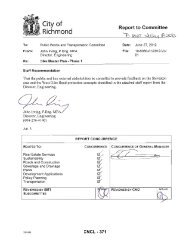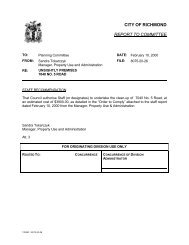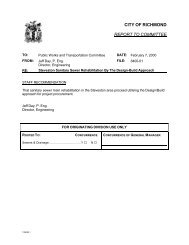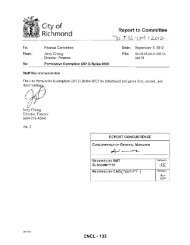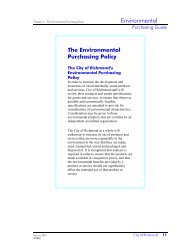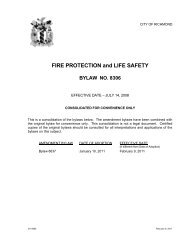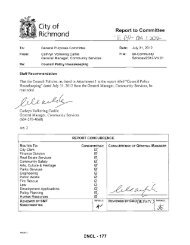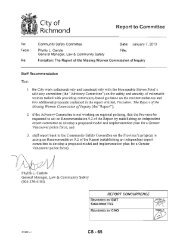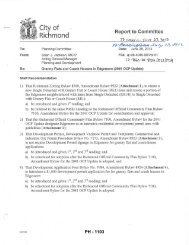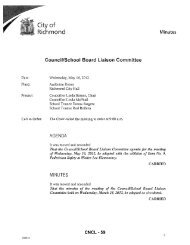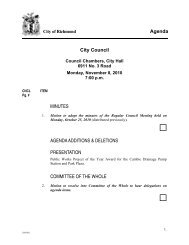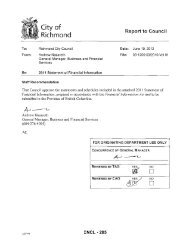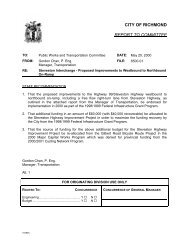Waste Flow Management in Metro Vancouver - City of Richmond
Waste Flow Management in Metro Vancouver - City of Richmond
Waste Flow Management in Metro Vancouver - City of Richmond
Create successful ePaper yourself
Turn your PDF publications into a flip-book with our unique Google optimized e-Paper software.
April 22, 2013 - 16-<br />
Attachment 1<br />
<strong>Metro</strong> <strong>Vancouver</strong> <strong>Waste</strong> <strong>Flow</strong> <strong>Management</strong><br />
Industry Workshop Summary - December 6, 2012<br />
1. Overview<br />
The communities <strong>of</strong> the <strong>Metro</strong> <strong>Vancouver</strong> region have endorsed progressive waste<br />
reduction and recycl<strong>in</strong>g goals as part <strong>of</strong> the Integrated Solid <strong>Waste</strong> Resource<br />
<strong>Management</strong> Plan (ISWRMP). <strong>Metro</strong> <strong>Vancouver</strong> has the authority for the management<br />
<strong>of</strong> municipal solid waste <strong>in</strong> the region.<br />
<strong>Metro</strong> <strong>Vancouver</strong> and the <strong>City</strong> <strong>of</strong> <strong>Vancouver</strong> apply disposal bans on recyclable materials<br />
to help meet the regional diversion goals at the Regional Facilities they manage (transfer<br />
stations and disposal facilities). The garbage tipp<strong>in</strong>g fee at Regional Facilities is set<br />
based on cost recovery through a user fee. This fee also encourages the diversion <strong>of</strong><br />
recyclables <strong>in</strong>clud<strong>in</strong>g yard trimm<strong>in</strong>g and food scraps as they are typically processed at a<br />
lower cost. Differential tipp<strong>in</strong>g fees and material disposal bans are key tools to meet the<br />
waste reduction and recycl<strong>in</strong>g goals. <strong>Metro</strong> <strong>Vancouver</strong> will implement additional<br />
disposal bans on food scraps and wood waste by 2015.<br />
However, certa<strong>in</strong> haulers are currently deliver<strong>in</strong>g some residential and commercial and<br />
<strong>in</strong>stitutional (ICI) waste to disposal facilities other than Regional Facilities, therefore<br />
bypass<strong>in</strong>g the waste diversion tools put <strong>in</strong> place at those facilities.<br />
Bypass<strong>in</strong>g the Regional Facilities allows those commercial haulers to:<br />
- Avoid disposal bans and prohibitions <strong>in</strong> effect at Regional Facilities, which are<br />
designed to encourage diversion and recycl<strong>in</strong>g<br />
- Avoid pay<strong>in</strong>g theirfair share <strong>of</strong> the costs to ma<strong>in</strong>ta<strong>in</strong> a reliable regional waste<br />
management system that is available for everyone for the long term<br />
Create an uneven play<strong>in</strong>g field for commercial haulers that cont<strong>in</strong>ue to use<br />
Regional Facilities.<br />
If action is not taken, and more commercial haulers cont<strong>in</strong>ue to bypass Regional<br />
Facilities, it is likely that the region w1ll not be able to enhance the local recycl<strong>in</strong>g<br />
<strong>in</strong>dustry, achieve the diversion targets set out <strong>in</strong> the ISWRMP, or deliver cost-effective<br />
and convenient waste management services for all residents and bus<strong>in</strong>esses throughout<br />
the region.<br />
To enable the region to encourage waste reduction and recycl<strong>in</strong>g, <strong>Metro</strong> <strong>Vancouver</strong> staff<br />
identified a range <strong>of</strong> waste flow management options. These options were shortlisted<br />
from a larger selection currently implemented by jurisdictions throughout North America.<br />
A staff preferred waste flow management approach was then developed through<br />
comparison <strong>of</strong> the options to a set <strong>of</strong> guid<strong>in</strong>g pr<strong>in</strong>ciples and also an operational and legal<br />
review <strong>of</strong> the options.<br />
The preferred approach would require all residential and ICI municipal solid waste<br />
generated <strong>in</strong> the Region to be delivered to Regional Facilities, except for material<br />
specifically exempted. To promote compliance, the preferred approach would <strong>in</strong>volve<br />
licens<strong>in</strong>g <strong>of</strong> waste haulers.<br />
On September 21, 2012, the Greater <strong>Vancouver</strong> Sewerage and Dra<strong>in</strong>age District<br />
(GVS&DO) Board considered the report titled "<strong>Waste</strong> <strong>Flow</strong> <strong>Management</strong> Update" and<br />
directed staff to <strong>in</strong>itiate consultation on the waste flow management options and the staff<br />
preferred approach presented <strong>in</strong> the report.<br />
The objectives <strong>of</strong> the engagement and consultation program are to provide potentially<br />
impacted and <strong>in</strong>terested stakeholders with:<br />
6916155<br />
3823131<br />
GP - 33



